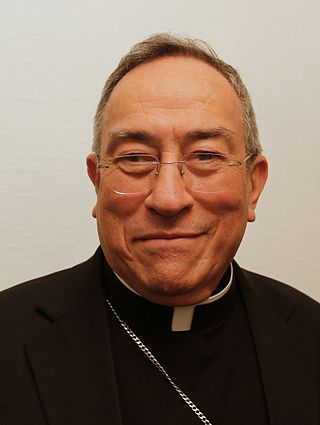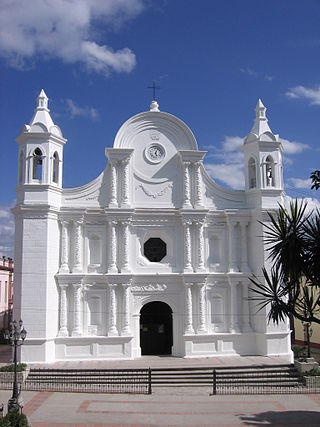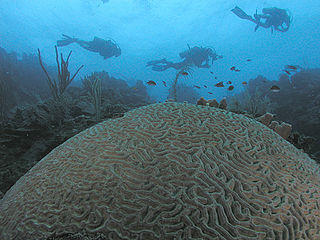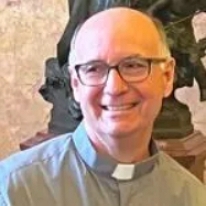Related Research Articles

Comayagua is a city, municipality and old capital of Honduras, located 80 km (50 mi) northwest of Tegucigalpa on the highway to San Pedro Sula and 594 m (1,949 ft) above sea level.

Our Lady of Suyapa, also known as the Virgin of Suyapa, is a title of the Virgin Mary, mother of Jesus Christ. An 18th-century cedar wood statue of the Virgin is perhaps Honduras' most popular religious image, and the focus of an extensive pilgrimage.

Óscar Andrés Rodríguez Maradiaga, S.D.B. is a Honduran prelate of the Catholic Church who was Archbishop of Tegucigalpa from 1993 to 2023. He was president of Caritas Internationalis and served as president of the Latin American Episcopal Conference (CELAM) from 1995 to 1999.

The Diocese of Yoro covers the department Yoro in Honduras. It is a suffragan diocese of the Archdiocese of San Pedro Sula.

The Catholic Church in Honduras is part of the worldwide Catholic Church, under the spiritual leadership of the Pope in Rome.

The Archdiocese of Tegucigalpa is a Latin Church ecclesiastical territory or archdiocese of the Catholic Church in Honduras. Until 2023, it was the only metropolitan see in Honduras, with its ecclesiastical province covering the whole country.

The Roman Catholic Diocese of Comayagua is a Latin suffragan bishopric in the ecclesiastical province of the Archdiocese of Tegucigalpa. The present diocese, erected 13 March 1963, revives a larger colonial bishopric.

Hondurans are the citizens of Honduras. Most Hondurans live in Honduras, although there is also a significant Honduran diaspora, particularly in the United States, Spain, and many smaller communities in other countries around the world.

The following is an alphabetical list of topics related to the Republic of Honduras.

The predominant religion in Honduras is Christianity, with Catholicism and Evangelicalism being its main denominations. The country is secular and the freedom of religion is enshrined in the nation's constitution.
Robert Camilleri Azzopardi O.F.M. was a Maltese Roman Catholic prelate who was the bishop of the Diocese of Comayagua in Honduras from 2004 until his death in 2023.

The nations of Honduras and Mexico established diplomatic relations in 1879. Both nations are members of the Association of Caribbean States, Community of Latin American and Caribbean States, Organization of American States, Organization of Ibero-American States and the United Nations.

Honduras is a touristic destination that attracts visitors due to its natural environment, white and dark sand beaches, coral reefs, abundant flora and fauna, colonial era towns, and archaeological sites. Other attractions include the area's customs and traditional foods. In 2019 Honduras received 2.8 million foreigners, half of those tourists are cruise passengers.

The Saint Agustín College, also known as Comayagua episcopal palace or "colegio tridentino de San Agustín de Comayagua" was higher academic Roman Catholic institution during the colonial period of New Spain in the province of Honduras.

Mons. Walter Guillén Soto is a Honduran prelate of the Catholic Church and a member of the Salesians of Don Bosco who has been the Bishop of Gracias in Honduras since 2021.

Comayagua International Airport, also known as Palmerola International Airport, is an international airport located 6 km (4 mi) south of the centre of Comayagua, Honduras. The airport was inaugurated in October 2021 as the country's new international airport for civil and commercial use. It was built at the facilities of the Soto Cano Air Base.

José Vicente Nácher Tatay, C.M. is a Spanish-born prelate of the Catholic Church and a member of the Vincentians who has worked as a missionary in Honduras since 2000. He has been Archbishop of Tegucigalpa since March 2023.
References
- 1 2 "Quienes somos?". Conferencia Episcopal (in Spanish). 3 October 2013. Archived from the original on 26 June 2016. Retrieved 3 January 2023.
- 1 2 3 "Monseñor Camilleri nuevo presidente de la Conferencia Episcopal de Honduras". Vatican News (in Spanish). 9 June 2022. Retrieved 3 January 2023.
- ↑ "Conozca cómo queda conformada la C.E.H para los próximos tres años" (in Spanish). Suyapa Medios. 9 June 2022. Retrieved 3 January 2023.
- ↑ "Cardinal Maradiaga turns 80 and loses right to vote in a future conclave". EWTN. 29 December 2022. Retrieved 3 January 2023.
- ↑ "Ángel Garachana, nuevo presidente de la Conferencia Episcopal de Honduras". Diocese of San Pedro Sula (in Spanish). 16 June 2016. Archived from the original on 6 July 2017.
- ↑ "Demos gracias a Dios por el 50 aniversario presbiteral de Monseñor Ángel Garachana" (in Spanish). Suyapa Medios. 19 March 2022. Retrieved 3 January 2023.
- ↑ "Mons. Ángel Garachana". Diocese of San Pedro Sula (in Spanish). 22 March 2019. Archived from the original on 27 June 2023. Retrieved 3 January 2023.
- ↑ Diaz, Daniel (10 June 2022). "Conozca un poco más de las historia de Monseñor Roberto Camilleri el nuevo presidente de la Conferencia de Obispos de Honduras" (in Spanish). Suyapa Medios. Retrieved 3 January 2023.